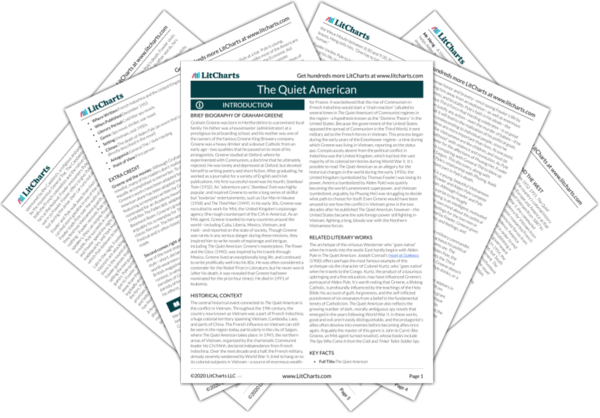Covering the war between the French colonialists and the communist rebels means Fowler must face death throughout the novel. And what he sees—bomb victims and slain women and children—cause Fowler to hate war. However, Fowler frets over the fact that his presence in the war, like accompanying a bombing mission that he is not even allowed to report on, makes him complicit in the death. The inevitability of death weighs heavily on Fowler. He often reflects on death as the one absolute in the world. His own old age and his frequent confrontations with death on a large scale make Fowler doubtful that anything could be considered permanent, since death is an inevitable and approaching end. His belief that nothing will be permanent brings about his passive behavior toward change. And yet, even so, he hates the change he sees coming. He is caught in a kind of stasis: he sees little point in life and claims to want to die, but is afraid of death and change. Fowler also relates his feelings about death to his feelings about relationships. Leaving his wife was a kind of cowardly death, he says. Furthermore, his happiness when with Phuong prevents him from wanting death to come. Yet, the relationship, like any for Fowler, is bittersweet because he fixates on its end, which he believes to be as inevitable as death.
Though Fowler does not kill Pyle himself, he helps arrange Pyle’s assassination. Though distanced, Fowler is still actively complicit in Pyle’s death, which mirrors Fowler’s relationship to reporting on the war. The climate of death spurred on by the war pervades Fowler’s personal life. To settle the “fight” over Phuong, Fowler resorts to assassination. The fleeting but horrid images of war dead in The Quiet American, coupled with its portrayal of the pervasiveness of cruelty in war, form a striking anti-war novel. While death is inevitable, as so plagues Fowler, Greene focuses on the needless casualties of war – mainly women and children – to condemn the vast toll war and the death it causes takes on individual human life and on society at large.
Inevitability of Death ThemeTracker

Inevitability of Death Quotes in The Quiet American
I walked back with Phuong towards my flat. I was no longer on my dignity. Death takes away vanity—even the vanity of the cuckold who mustn’t show his pain.
From childhood I had never believed in permanence, and yet I had longed for it. Always I was afraid of losing happiness. This month, next year, Phuong would leave me. If not next year, in three years. Death was the only absolute value in my world. Lose life and one would lose nothing again for ever. I envied those who could believe in a God and I distrusted them. I felt they were keeping their courage up with a fable of the changeless and the permanent. Death was far more certain than God, and with death there would be no longer the daily possibility of love dying. The nightmare of a future of boredom and indifference would lift. I could never have been a pacifist. To kill a man was surely to grant him an immeasurable benefit. Oh yes, people always, everywhere, loved their enemies. It was their friends they preserved for pain and vacuity.
The canal was full of bodies: I am reminded now of an Irish stew containing too much meat. The bodies overlapped: one head, seal-grey, and anonymous as a convict with a shaven scalp, stuck up out of the water like a buoy. There was no blood: I suppose it had flowed away a long time ago. I have no idea how many there were: they must have been caught in a cross-fire, trying to get back, and I suppose every man of us along the bank was thinking, “Two can play at that game.” I too took my eyes away; we didn’t want to be reminded of how little we counted, how quickly, simply and anonymously death came. Even though my reason wanted the state of death, I was afraid like a virgin of the act. I would have liked death to come with due warning, so that I could prepare myself. For what? I didn’t know, nor how, except by taking a look around at the little I would be leaving.
“You saved my life there,” I said, and Pyle cleared his throat for the conventional response,
“So that I could die here. I prefer dry land.”
“Better not talk,” Pyle said as though to an invalid.
“Who the hell asked you to save my life? I came east to be killed. It’s like your damned impertinence . . .” I staggered in the mud and Pyle hoisted my arm around his shoulder. “Ease it off,” he said.
“No. I’m not so stupid. One doesn’t take one’s enemy’s book as a souvenir. There it is on your shelf. The Rôle of the West. Who is this York Harding?” “He’s the man you are looking for, Vigot. He killed Pyle—at long range.”
I thought of the first day and Pyle sitting beside me at the Continental, with his eye on the soda-fountain across the way. Everything had gone right with me since he had died, but how I wished there existed someone to whom I could say that I was sorry.











